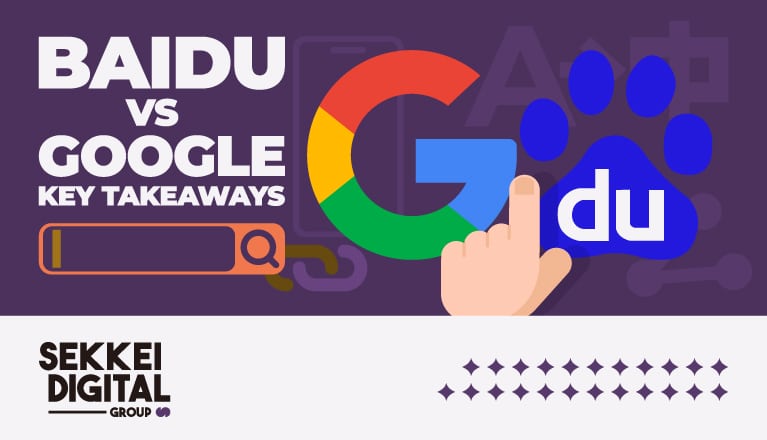Optimizing for search engines is an excellent way to amplify your marketing strategy. However, due to the Great Firewall policy implemented by the Chinese government, the platforms available to local users differ greatly from the West.
While Google serves as the solution to daily online queries worldwide, Baidu is the dominating platform in the Chinese search engine market.
So, if you’re a brand trying to conduct search engine optimization in Mainland China, understanding and comparing Google vs Baidu can be instrumental to your digital marketing success.
In this post, we’ll tackle the differences between the two search engines and determine how these factors affect how your brand connects with Chinese users.
Is Baidu as big as Google?
According to recent reports, Google has approximately 3.5 billion daily users worldwide. The sheer size of its user base has led the platform to acquire the highest global search market share of 83.49%.
Meanwhile, Baidu only boasts 218 million daily users. While it may seem noticeably less populated than Google, it covers 72% of the Chinese search market.
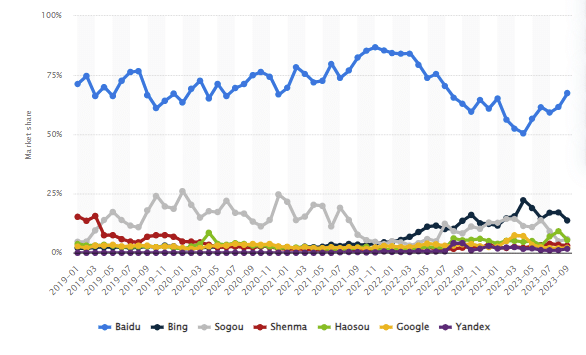
Leading search engines in China 2019-2023 by market share (Source: Statista)
As you can see from the graph above, Baidu is leading by a huge margin from China’s second-largest search engine, Bing. On the other hand, Google only has over 3% of the search engine market share locally.
Chinese users have limited access to Google, so comparing it with Baidu based on size does not determine the exact scale of their usability or influence. Nevertheless, the latter has an obvious advantage, especially if you intend to do business within the Chinese market in the long run.
8 Notable Differences Between Google and Baidu
1. Google and Baidu have different algorithms
The key differences between Google and Baidu mainly stem from the algorithms used in their search results. For example, meta keywords are pretty much not part of the ranking factors in Google. Instead, the platform gives more significance to meta descriptions as these elements inform users of what the content is about.
Meanwhile, Baidu search rankings are still influenced by the use of meta keywords. Most search engine experts advise adding at least three to five keywords on web pages to rank higher on this local platform.
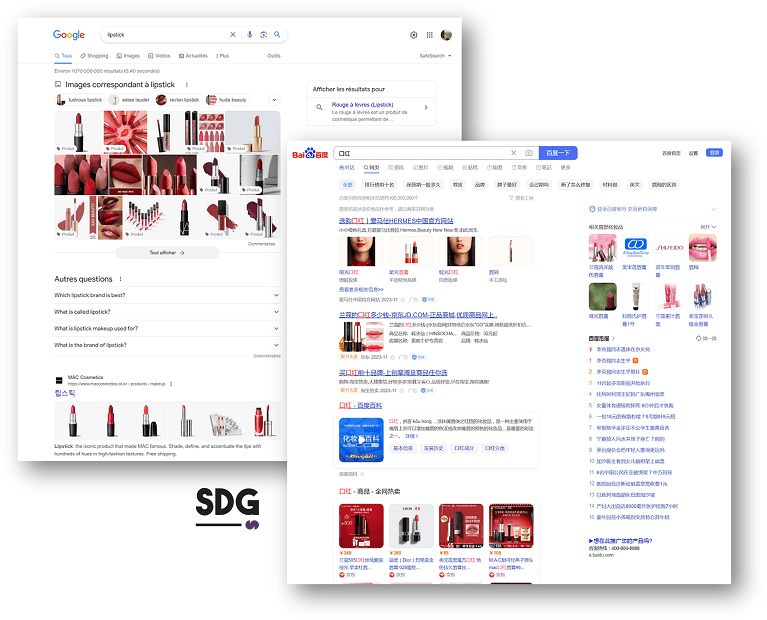
Baidu has two algorithms that often handle platform issues: Money Plant and Pomegranate. While these search engine technologies are seen as less advanced than Google’s Penguin algorithm, they can down-rank low-quality content and detect link spam or stuffed keywords.
Besides low-quality content, these algorithms check for Chinese sites with poor user experience that can potentially stem from excessive advertisement placement.
Baidu’s technology also favors websites with a flat site structure. When you’re nailing down your local SEO strategy, it helps if your website has clear site maps and clean internal links.
2. Baidu favors websites with Internet Content Provider (ICP) licenses
Baidu and Google will rank your content on search results pages with or without official licenses. However, when it comes to marketing in the Chinese market, acquiring a business ICP license is not a step you can casually skip.
While not explicitly stated, local search engines like Baidu offer ranking preference to site owners who purchased ICP licenses from the Chinese Ministry of Industry and Information Technology (MIIT).
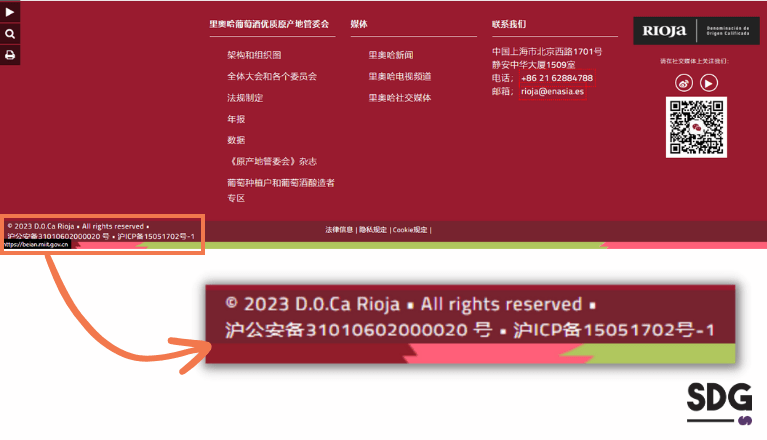
Chinese ICP license for our client RIOJA WINE
This registration gives your brand and website more credibility in the eyes of the Chinese audience your brand is trying to reach.
To get an ICP license, you typically must provide different requirements like a Chinese phone number and mailing address within the country.
However, if you’re a foreign brand without a Chinese business license, you can get a commercial-type permit that allows you to operate online and build a presence on popular e-commerce sites.
3. The Baidu advertising platform is more restrictive
Much of Google and Baidu’s key differences lie within their advertising platforms, from custom targeting options to available formats. While both search engines have requirements before you can launch campaigns, China’s restrictive policies make the implementation of Baidu ads extra tricky.
Besides the paperwork and licenses a non-Chinese company must apply, all Baidu ads must abide by local advertising laws and undergo a rigorous approval process.
You’ll also notice that Baidu ads have fewer formats available. Typically, its advertising categories mostly revolve around four types: search, display, native, and brand zone. Meanwhile, Google has more distinct offerings like discovery, smart, and shopping ads that cater to specific brand needs.
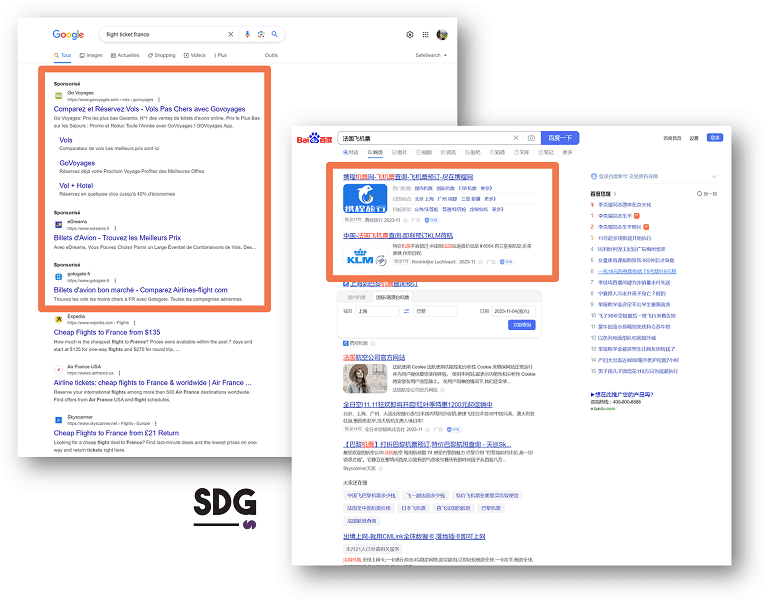
The global reach of Google ads can’t be compared with what Baidu can offer, but you might be pleased to know that this popular search engine considers keywords as its core targeting function.
Thanks to its accuracy, Baidu ads are more likely to result in higher conversion rates, especially for brands focusing on B2B transactions.
4. Baidu and Google charge for ads differently
Unlike Baidu, you don’t need a minimum fee requirement when using Google ads. The platform will charge you on credit that will go through your monthly payments based on the campaign results.
On the other hand, Baidu requires foreign companies to make an initial ad credit deposit of around 1,000 to 1,500 USD, depending on location. On top of that, foreign marketers must also pay a registration fee to verify their advertising account on the platform.

Baidu Paid Advertising for our client UNSW Global
Both Baidu and Google operate on Pay-Per-Click (PPC) models, so advertisers on both platforms are charged on clicks and not views. However, according to some reports, common search terms used for the B2B Chinese market appear 25-40% more affordable in Baidu than in Google.
It’s also worth noting that foreign companies from countries like France, Hong Kong, Macao, and Taiwan are not required to pay the initial ad credit deposit.
5. Baidu search ranking prioritizes Chinese websites
The fact that Baidu and Google utilize different languages is the core of all the differences between these two search engines. Being a local platform, Baidu has a clear ranking preference for Chinese language content.
When laying out your Baidu SEO strategy, it’s important to remember that there are a very limited number of Chinese speakers who prefer or understand English.
Because of this, it’s highly recommended for foreign brands to host a Chinese version of their website locally. If hosting locally is not an option, global marketers can use Chinese CDN (Content Delivery Network).

Localizing your website will not only make your web pages favorable within Baidu’s Chinese servers, but it will also improve its loading time. As mentioned above, user experience quality is also a crucial ranking factor in this platform.
While it’s true that Baidu will consider content written in different Chinese languages, the platform has a strong bias toward Simplified Chinese. The platform is more adept at finding and crawling websites in this language format than traditional.
6. Social Media has more impact on Baidu SEO
Baidu offers a variety of highly trusted social media platforms, each operating with a massive user base and engaged online community. Some examples you’ll find are Baidu Tieba, Zhihu, and Douban.
Since Baidu owns these platforms, the high-quality content from these channels is more likely to rank well as long as it’s properly optimized.

Besides the platforms owned and affiliated with Baidu, content from other top social media apps like Sina Weibo also gives your brand a chance to appear on industry-related topical searches.
When trying to rank content from social media sites, marketers must remember that Baidu considers frequent profile and post updates as a ranking factor. Besides that, having a verified account and a high follower count gives the impression of authority.
7. Optimizing for mobile web browsing is more crucial in Baidu
As mobile browsing becomes increasingly prevalent, Google has implemented a “mobile-first” approach in its ranking algorithm. This implementation means that the platform’s algorithm prioritizes the mobile version of a website.
If the site isn’t optimized for mobile or hides relevant content on its mobile version, marketers will see a decline in their Google rankings.
On the other hand, the emphasis on mobile compatibility is even more pronounced in Baidu’s ranking system. Given that mobile usage in China has already reached 74.5%, surpassing many other regions, ensuring mobile optimization is essential for achieving competitive rankings on Baidu.
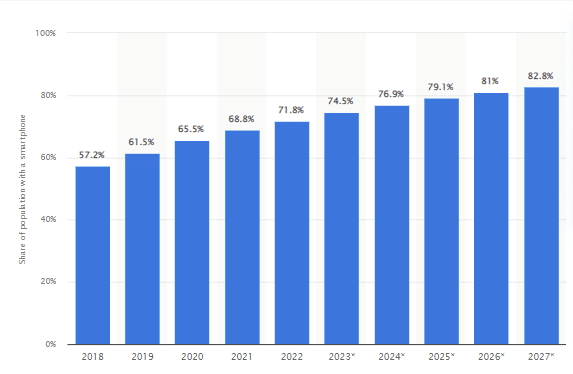
Smartphone penetration as share of population in China 2018-2027 (Source: Statista)
8. Chinese backlinks are more valuable in Baidu
Both Google and Baidu utilize backlinks as a significant ranking factor, viewing them as relevant signs of credibility and authority for a website domain.
The more reputable the referring site is, the higher the chance for Baidu to assign the content with a better ranking. However, marketers should note that each search engine has distinct nuances and susceptibilities.
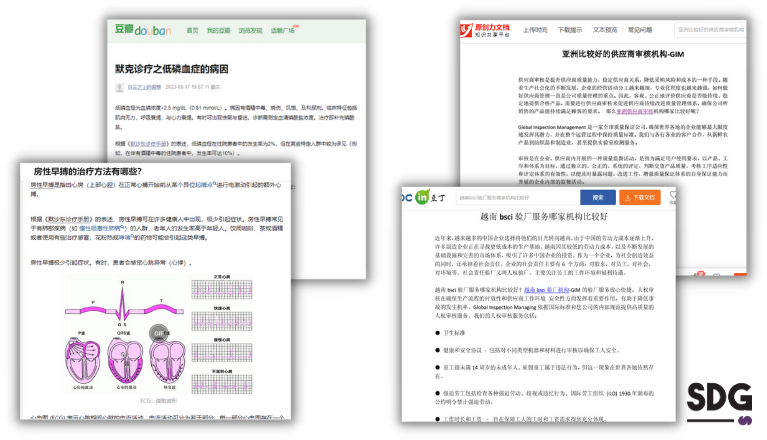
Examples of backlinks articles on Baidu for our clients GIM and Merck
Baidu tends to give more weight to the anchor text of backlinks than Google does. This preference can influence how Baidu’s algorithm interprets keywords and their relevance.
On top of that, the platform often prioritizes backlinks originating from Chinese websites, indicating a regional preference that aligns with its user base. The only problem is its strong emphasis on China-based backlinks can make it more susceptible to SEO manipulation, especially through link spam.
What is special about Baidu?
One of Baidu’s biggest advantages over Western search engines is that it’s predominantly tailored for the Chinese market. It’s deeply integrated with the local digital ecosystem and is optimized for Chinese search queries.
This regional specialization makes it an indispensable tool for marketers looking to enter China’s business scene.
Like Google, Baidu is not just a search engine. It offers services such as Baidu Baike (similar to Wikipedia), Tieba (a popular forum platform), and Maps. However, how these services are intertwined and prioritized in search results can differ from how Google integrates its built-in tools.
Quick Q&A
Why is there no Google in China?
The absence of Google in China mainly stems from its conflict with the Chinese government. By 2010, the platform’s search engine traffic was redirected to its uncensored Hong Kong site. The “Great Firewall” further complicated Google’s operability in the region.
Without Google in the local business scene, domestic platforms like Baidu have become dominant, capitalizing on their deep understanding of local market nuances.
Which is better Baidu or Google?
For users in China, Baidu offers a more localized search experience, with results tailored to the Chinese language and culture. Meanwhile, Google is partially restricted in the country. Nevertheless, it’s more renowned for its comprehensive search algorithms and wide-reaching services that cater to an international audience.
Objectively, neither is inherently superior; rather, their effectiveness and utility cater for the specific needs and context of the user.
Does Baidu Only Work in China?
No, Baidu is not limited to working only in China. The platform can be accessed anywhere in the world. However, many of its services, especially beyond the search engine, like Baidu Maps or Baidu Baike, are heavily China-centric in content and utilization. It also may appear slower or less optimized than their local counterparts when used outside the Chinese market.
Your Trusted Search Engine Optimization Partner in China!
As a foreign business, comparing Baidu vs Google serves as your blueprint for deciding how to position your brand locally. While Baidu undoubtedly holds more power in China’s business scene, it’s worth noting that this platform requires technical understanding that highly differs from how SEO works in the West.
Don’t let the complexities of the Chinese market hold you back! Our experienced team is here to guide you through every twist and turn, unlocking your brand’s full potential and ensuring resounding success in this dynamic landscape.
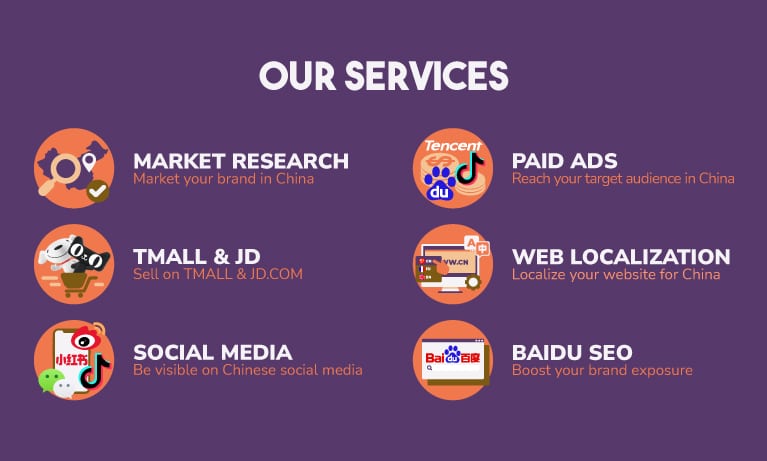
We offer comprehensive services to empower your Baidu SEO & SEM strategies in China. From crafting compelling marketing campaigns to harnessing the power of SEO and social media, we provide the digital solutions you need to thrive. Contact us today to learn more!
References:
Baidu vs Google: What’s the Difference?
Baidu Vs. Google: A Comparison
Google vs Baidu: Key Differences in SEO Strategy
Baidu vs Google: 5 Reasons To Start Using Baidu Ads in 2023

